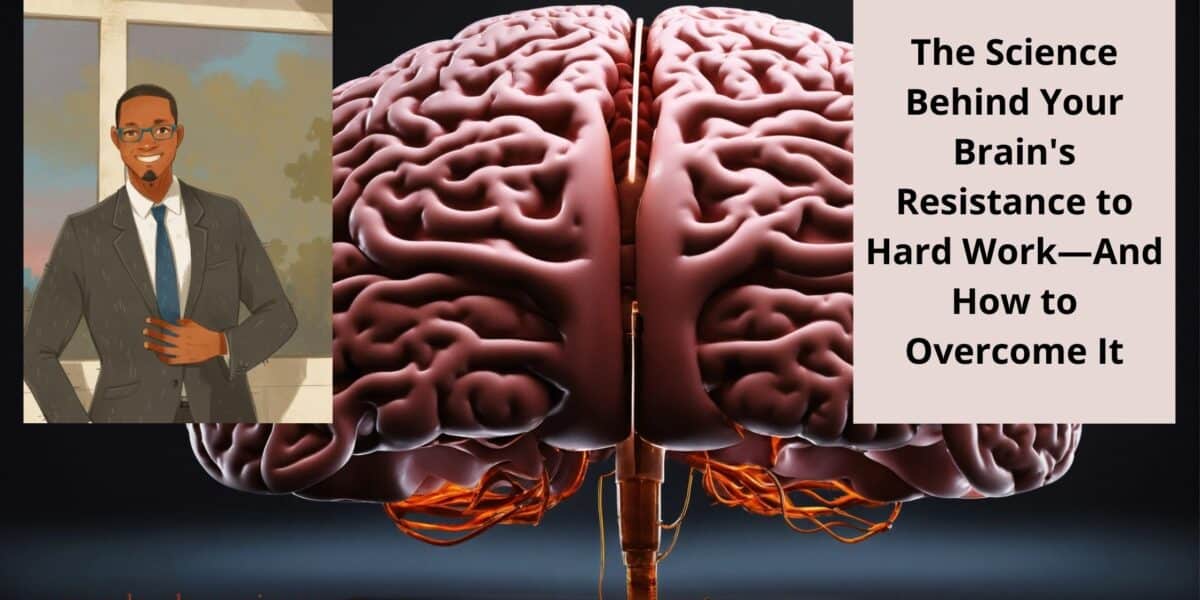The Science Behind Your Brain’s Resistance to Hard Work—And How to Overcome It

Why does hard work often feel so overwhelming? The truth lies in how our brain is wired. Our brains are designed to conserve energy and avoid tasks that seem daunting or require prolonged effort. This resistance, while natural, can prevent us from achieving our full potential. Understanding the science behind why our brains resist hard work is the key to overcoming these mental barriers and unlocking higher levels of productivity and success.
In this post, we’ll explore how the brain functions in response to difficult tasks, the role of motivation and fear, and strategies you can use to push past resistance and make meaningful progress on your goals.
Understanding Cognitive Resistance

Our brains are naturally inclined to resist tasks that require significant mental effort, and this resistance is rooted in evolutionary biology. Historically, conserving energy was crucial for survival, which meant avoiding unnecessary or high-effort tasks. While our modern world doesn’t require the same survival instincts, our brains still operate in ways that prioritize conserving energy, especially when faced with mentally demanding tasks.
The Role of the Prefrontal Cortex
The prefrontal cortex is the part of the brain responsible for higher-level functions such as planning, decision-making, and problem-solving. When faced with challenging tasks, this area is forced to work harder. Unlike habitual or automatic tasks that involve other parts of the brain, difficult tasks require more cognitive resources, leading to mental fatigue.
Why Mental Resistance Occurs
This resistance happens because the brain perceives high-effort tasks as energy-draining. As a result, we often procrastinate or avoid difficult tasks to preserve mental energy, which is a protective mechanism. Unfortunately, this can hinder personal growth and productivity in modern contexts, where intellectual effort is crucial to success.
Pushing Through Resistance
Understanding cognitive resistance helps in overcoming it. By acknowledging that the brain’s resistance to effortful tasks is natural, you can develop strategies like breaking down complex work into smaller tasks, allowing the prefrontal cortex to handle the effort more efficiently without overwhelming the brain.
Training the brain through repetitive exposure to challenging tasks can also help reduce resistance over time, as the brain adapts and builds cognitive endurance.
The Role of Dopamine in Motivation

Dopamine is often referred to as the brain’s “reward chemical” because it plays a key role in motivating behavior, especially when it comes to goal-setting and effort. However, what’s fascinating about dopamine is that it is more closely tied to the anticipation of a reward than the completion of the work itself. This means that the brain releases dopamine not just after achieving a goal but during the process of working toward it, especially when you know you’re progressing.
Anticipation vs. Achievement
While we often think that satisfaction comes from completing a task, dopamine is actually triggered by the anticipation of achieving a goal. This is why envisioning success or breaking down larger tasks into smaller, achievable goals can significantly boost motivation. Each small win along the way provides a dopamine hit, which fuels your drive to continue.
Small Wins Build Momentum
By setting smaller, more manageable goals, you create a steady stream of dopamine rewards that keeps you engaged and motivated. This is why productivity experts often suggest breaking down larger tasks into bite-sized pieces. As each small task is completed, the brain experiences a surge of dopamine, reinforcing the behavior and making it easier to take on more challenging or long-term goals.
Example: In fitness or learning new skills, incremental progress like completing a chapter of a course or mastering a new workout provides dopamine, encouraging continued effort.
Understanding this dynamic can help you leverage dopamine to your advantage by rewarding yourself frequently for small accomplishments, keeping motivation high even during more challenging projects.
The Habit Loop and Comfort Zone

The brain is naturally wired to seek comfort and avoid stress, leading it to favor tasks that are familiar, easy, and well within the comfort zone. This is a result of evolutionary biology, where conserving energy was vital for survival. In contrast, hard work that challenges existing patterns triggers stress responses, making it feel uncomfortable and something to avoid. These stress responses often make difficult tasks appear more daunting, leading to procrastination or avoidance.
How the Habit Loop Works
The habit loop consists of three elements: cue, routine, and reward. When the brain identifies a familiar cue, it triggers an automatic routine, leading to a sense of reward and comfort. This cycle repeats, creating ingrained behaviors that are hard to break. Unfortunately, many of these habitual routines tend to prioritize short-term comfort over long-term growth, such as opting for easy tasks instead of challenging ones that require more mental effort.
Rewiring the Habit Loop
To overcome resistance to hard work, it’s essential to gradually rewire the brain’s habit loop. By repeatedly engaging in challenging tasks, the brain can learn to associate hard work with positive outcomes, not just stress. Over time, the brain will adapt to these new patterns, making difficult tasks feel less overwhelming and more like familiar routines. Repetition and consistency are key in this process, as they help the brain build new neural pathways that favor productive habits.
Example: Athletes and musicians often repeat difficult drills or practice routines until they become second nature. Through consistent repetition, what initially feels challenging becomes a regular part of their skill set.
The more you step outside your comfort zone and push yourself into these challenging tasks, the more the brain rewires itself to embrace hard work. This helps break the cycle of procrastination and makes you more resilient in tackling complex tasks in the future.
Decision Fatigue and Mental Energy

Every decision we make throughout the day depletes our mental energy, a phenomenon known as decision fatigue. This explains why difficult tasks, especially those requiring focus and problem-solving, feel more challenging as the day progresses. The prefrontal cortex, which is responsible for decision-making and complex thought processes, becomes less efficient when overworked, leading to procrastination, impulsive choices, or avoidance of mentally taxing tasks.
Understanding Decision Fatigue
When faced with too many decisions—big or small—the brain becomes overwhelmed, leading to poor decision-making or burnout. This effect compounds as the day goes on, especially if tasks aren’t prioritized effectively. Simple decisions, like what to wear or eat, use up the same mental resources as more significant decisions, reducing the brain’s capacity for hard work later in the day.
Prioritizing Challenging Tasks
One effective strategy to combat decision fatigue is to prioritize challenging or important tasks in the morning, when mental energy is at its peak. By scheduling high-priority tasks early in the day, you’re more likely to tackle them with better focus and efficiency. Additionally, creating routines and habits reduces the need for minor decision-making, conserving mental energy for more critical tasks.
Example: Many successful individuals, like Steve Jobs or Barack Obama, simplified their wardrobe choices to reduce daily decision-making, freeing up mental energy for more important matters. Similarly, developing a structured morning routine can ensure that your first few hours are spent tackling complex work without draining mental resources on trivial decisions.
Implementing these strategies can help you stay productive, reduce the impact of decision fatigue, and approach difficult tasks with a clearer, more focused mind.
Fear of Failure and Brain Response

When faced with difficult tasks, the brain often perceives them as potential threats, triggering the fear of failure. This response activates the amygdala, the brain’s fear center, which can cause avoidance behaviors like procrastination or giving up prematurely. The fear response is hardwired to protect us from perceived risks, even though failing at a task isn’t physically dangerous. This reaction can make it harder to engage in challenging work or take necessary risks that lead to personal growth.
Brain’s Fear Response
The amygdala’s activation during difficult tasks is part of the brain’s survival mechanism, but it can be counterproductive when working on personal or professional goals. This fear of failure may manifest as self-doubt or perfectionism, preventing individuals from even starting the work or abandoning it when challenges arise. Fear creates stress, which further clouds decision-making and diminishes performance.
Reframing Failure as a Learning Opportunity
One way to counter the brain’s fear response is to shift the mindset around failure. Rather than viewing failure as a negative outcome, reframing it as a stepping stone or learning experience can help deactivate the amygdala’s reaction. By perceiving mistakes as valuable feedback rather than a sign of incompetence, you can approach difficult tasks with more resilience and persistence.
Example: Many entrepreneurs and innovators, such as Thomas Edison, viewed failure as an essential part of the process. Edison famously noted that he did not fail but rather found “10,000 ways that won’t work” before perfecting the lightbulb. This mindset reduces fear and encourages continued effort despite setbacks.
By practicing this cognitive shift, you can calm your brain’s fear response, making it easier to tackle challenges and continue growing, even when success isn’t guaranteed immediately.
Overcoming Procrastination through Mindfulness
Procrastination is often the brain’s way of avoiding discomfort, especially when faced with challenging tasks. The desire for instant gratification leads people to seek out distractions that offer temporary relief, such as social media or non-essential activities. This avoidance behavior stems from the brain’s instinct to avoid stress or difficulty, even if it results in long-term consequences, like missed deadlines or diminished productivity.
Procrastination and Immediate Relief
When you procrastinate, the brain seeks to escape the discomfort of hard work by shifting focus to more pleasurable, low-effort activities. These distractions trigger a short-term dopamine release, reinforcing the habit of procrastination. The brain prioritizes this immediate sense of relief over the long-term satisfaction of completing difficult tasks, which is why overcoming procrastination can feel so challenging.
Using Mindfulness to Manage Procrastination
Mindfulness is a powerful tool to counteract procrastination because it encourages staying present and focused, reducing stress and anxiety associated with difficult work. By focusing on one step at a time rather than the enormity of the task, mindfulness helps quiet the brain’s urge for distraction. Mindfulness practices such as deep breathing or body scans allow individuals to recognize the discomfort without immediately reacting to it.
By practicing mindfulness regularly, you can build resilience to discomfort and train your brain to stay engaged with the task at hand. This reduces the likelihood of procrastination and helps shift focus from immediate relief to long-term success.
Example: Meditation apps like Calm and Headspace use mindfulness techniques to help users overcome procrastination by promoting focus, calmness, and stress management. By being present and aware of each moment, you become less reactive to discomfort and more able to stay committed to your work.
Incorporating mindfulness into daily routines helps build long-term habits that allow you to tackle difficult tasks with more ease and confidence, gradually reducing procrastination.
Building Mental Endurance Through Incremental Progress
The brain thrives on success, and when it experiences gradual victories, it develops resilience and endurance for more challenging tasks. This phenomenon is rooted in the brain’s reward system, which reinforces behaviors that lead to positive outcomes. By achieving small wins, individuals can increase their confidence, making it easier to tackle larger, more daunting projects.
The Importance of Small Wins
When faced with a significant task, the sheer size of it can feel overwhelming, triggering mental resistance. However, breaking down these large tasks into smaller, manageable chunks can create a sense of progress. Each small victory acts as a positive reinforcement, encouraging you to continue moving forward. This approach not only builds mental endurance but also helps mitigate feelings of anxiety or inadequacy that often accompany difficult work.
Celebrating Achievements
Recognizing and celebrating these small accomplishments is crucial for maintaining momentum. Whether it’s completing a segment of a project or simply sticking to a routine for a few days, acknowledging these successes provides a dopamine boost that can keep motivation levels high.
For example, when writing a lengthy report, breaking it down into sections allows you to focus on one part at a time. Completing each section not only advances your work but also provides a sense of achievement that fuels your drive to continue.
Practical Strategies
- Chunking Tasks: Divide larger projects into smaller tasks that can be completed in a shorter time frame. This makes the overall goal seem less daunting and more attainable.
- Setting Milestones: Establish clear milestones along the way, marking significant points in your progress. Celebrate when you reach these milestones to reinforce positive behavior.
- Reflecting on Progress: Take time to review what you’ve accomplished. Journaling or sharing your progress with others can help solidify your achievements in your mind.
Example: Implementing Incremental Progress
Many productivity systems, like the Pomodoro Technique, leverage this concept by encouraging users to focus on work for a set period (typically 25 minutes) followed by a short break. This method allows individuals to experience regular moments of accomplishment, reinforcing their commitment to productivity.
By building mental endurance through incremental progress, you prepare your brain to handle more significant challenges in the future. Over time, this approach not only reduces cognitive resistance but also fosters a growth mindset, empowering you to embrace difficult tasks with confidence.
The Importance of Physical Well-Being

Physical health plays a critical role in determining how effectively our brains function, especially when tackling challenging tasks. Numerous studies have shown that factors like sleep, diet, and physical activity significantly impact cognitive performance and resilience. When our physical health is compromised, our brains often struggle to handle mental efforts, leading to increased resistance to hard work.
Impact of Sleep on Cognitive Function
Sleep is essential for cognitive processes such as memory consolidation, problem-solving, and emotional regulation. According to the National Sleep Foundation, insufficient sleep can impair attention, alertness, concentration, reasoning, and problem-solving skills, all of which are vital for effective decision-making and tackling challenging tasks. A study published in Sleep Health highlighted that sleep deprivation negatively affects cognitive performance and increases susceptibility to stress.
Nutrition’s Role in Mental Clarity
A balanced diet rich in essential nutrients is crucial for optimal brain function. Foods high in omega-3 fatty acids, antioxidants, and vitamins can enhance cognitive abilities and improve mood. For example, research published in Frontiers in Aging Neuroscience indicates that diets high in fruits, vegetables, and healthy fats are associated with improved cognitive function and reduced cognitive decline . Conversely, diets high in processed sugars and unhealthy fats can lead to inflammation and impair cognitive performance, increasing mental fatigue during difficult tasks.
Benefits of Regular Exercise
Regular physical activity is one of the most effective ways to boost brain function and overall mental health. Exercise increases blood flow to the brain, delivering oxygen and nutrients essential for cognitive performance. According to a review in Psychological Bulletin, exercise has been linked to enhanced memory, improved mood, and reduced anxiety . Moreover, engaging in physical activity can stimulate the release of endorphins, which promote a sense of well-being and reduce the perception of stress, making it easier to tackle tough work.
Building a Healthy Routine
Establishing a consistent routine that prioritizes sleep, nutrition, and exercise can create a strong foundation for cognitive resilience. Here are a few strategies to improve physical well-being:
- Prioritize Sleep: Aim for 7-9 hours of quality sleep each night. Develop a calming bedtime routine and keep a consistent sleep schedule.
- Eat a Balanced Diet: Focus on whole foods such as fruits, vegetables, lean proteins, and healthy fats. Limit processed foods and sugar intake to maintain stable energy levels.
- Incorporate Regular Exercise: Aim for at least 150 minutes of moderate aerobic activity each week, complemented by strength training exercises. Find activities you enjoy to make it more sustainable.
- Stay Hydrated: Proper hydration is vital for optimal brain function. Aim for adequate water intake throughout the day to support cognitive processes.
Example: Implementing Healthy Habits
Individuals who integrate these elements into their daily lives often report feeling more energized and capable of tackling difficult tasks. For instance, starting the day with a nutritious breakfast and a brief workout can set a positive tone, making it easier to face challenges head-on.
Conclusion
Understanding the science behind your brain’s resistance to hard work is a powerful step toward personal and professional growth. By recognizing the natural tendencies of our minds, we can employ effective strategies to push through challenges and reach our goals. Remember, overcoming mental resistance isn’t just about brute force; it’s about harnessing your motivation, breaking tasks into manageable pieces, and creating an environment conducive to productivity.
Now, it’s your turn! What strategies have you found effective in overcoming your brain’s resistance to hard work? Share your thoughts in the comments below, and let’s inspire each other on this journey to success! If you found this post insightful, don’t forget to share it with others who might benefit.